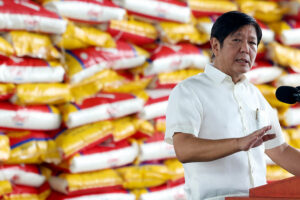Marcos removes cap on rice prices

By Kyle Aristophere T. Atienza and Adrian H. Halili, Reporters
PRESIDENT Ferdinand R. Marcos, Jr. on Wednesday said he has lifted the cap on rice prices, a month after it was imposed to temper inflation.
Analysts said the decision — two days after a national survey showed a double-digit decline in Mr. Marcos’ approval ratings — was more of a political move than an economic one.
“As of today, we are lifting the price caps on the rice, for the regular milled rice and for the well-milled rice. So, we are removing the controls,” Mr. Marcos told reporters on the sidelines of a rice distribution event in Taguig City on Wednesday.
The government imposed the price ceiling on Sept. 5, in a bid to rein in the spike in rice prices which the President had attributed to hoarding and collusion among cartels. Prices were capped at P41 a kilo for regular milled rice and P45 for well-milled rice.
However, Mr. Marcos admitted the government still needs to address the staple grain’s high prices in Metro Manila.
“When we were looking at the statistics yesterday, the real problem is here in the National Capital Region, where the price of rice is high,” he said. “But that’s natural because we’re in the city. It takes a long time for the rice to arrive here, and the transportation, storage, and processing fees become expensive.”
Mr. Marcos said he had instructed House Speaker Ferdinand Martin G. Romualdez to create a program for the capital region, where rice prices are “most volatile.” Thirty-three congressmen from Metro Manila would be tasked to distribute rice to poor people, he added.
Arjan P. Aguirre, who teaches politics at the Ateneo de Manila University, said the move only confirms that the administration’s agriculture decisions, especially on rice issues, have been driven by politics.
“This hasty and sudden decision to lift the price cap can be explained by two things: they finally realized that the price cap is not really a sound policy and that they need to arrest the drop in the President’s approval ratings,” he said in a Facebook Messenger chat.
Mr. Marcos’ approval ratings fell by double digits across all areas and socioeconomic classes, according to a Pulse Asia Research, Inc. survey conducted from Sept. 10 to 14, with economists attributing this decline to the high prices of basic commodities like rice.
Mr. Aguirre noted that Mr. Marcos’ decision to appoint himself Agriculture secretary was meant “to target the largest political base in our society — classes D and E.”
“They are the ones who are vulnerable to any changes in commodity prices and that most of them are invested in any industry attached to agriculture,” he said.
Mr. Marcos, speaking at the chance briefing, said the decline in his approval ratings was “not surprising” since people are “having a hard time.”
‘WRONG POLICY’“Of course, the lifting of the price cap is welcome,” Action for Economic Reforms coordinator Filomeno S. Sta. Ana III said. “In effect, the government concedes that it was a wrong policy.”
Mr. Sta. Ana said the announcement was not “transparent” enough since there are still questions on the real reasons behind the price cap order.
Mr. Marcos has been saying that the country has enough rice supply, blaming economic saboteurs — hoarders and smugglers alike — for the commodity’s spiraling prices.
Federation of Free Farmers National Manager Raul Q. Montemayor said the lifting of the price ceiling will stabilize palay prices amid the ongoing harvest season.
“And it will provide incentives for farmers to expand their production and reduce our reliance on imports… We also expect retail prices of rice to go down without the need for price caps,” Mr. Montemayor said via Viber.
Samahang Industriya ng Agrikultura Executive Director Jayson H. Cainglet estimated that with palay farmgate prices now at P23 to P25 per kilo the “retail prices of well-milled rice can be sold between P43 and P44 per kilo, way below the price cap.”
The National Food Authority Council last month set a new purchase rate for dry and wet palay at P19-P23 and P16-P19 per kilogram, respectively. The previous buying price was P16 per kilo for wet and P19 per kilo for dry palay.
Leonardo A. Lanzona, an economics professor from Ateneo de Manila University, said that there was “no point” for the price cap as the harvest would have been enough to pull down prices and discourage hoarding.
“Rice is perishable so it is unlikely that these traders can keep their contraband for long,” Mr. Lanzona said in a Messenger chat.
Philippine Institute for Development Studies Senior Research Fellow Roehl M. Briones said that supply of regular milled and well-milled rice had disappeared as retailers were just waiting for the lifting of the price ceiling.
“The lasting effect of the price ceiling spells a business climate where the policy environment is less predictable,” he said in a phone call.
Former Finance Undersecretary Cielo D. Magno said to keep rice prices low, the government needs to ensure that the NFA has sufficient buffer stock and improve the productivity of the rice sector by providing them with adequate and efficient drying facilities and introducing them to more resilient and climate smart rice varieties.
“We have to be mindful of the effect of climate change on the rice sector,” she added.
Meanwhile, the Department of Trade and Industry (DTI) said it will still give financial aid to small rice retailers who were affected by the price ceiling.
“It was just a one-time financial aid. We are going to continue giving the financial aid so that it would be fair for all,” Trade Secretary Alfredo E. Pascual told reporters in Filipino at a press briefing on Wednesday.
As of Sept. 29, only 14,480 out of the targeted 19,685 micro and small rice retailers nationwide have received financial aid.
Fhillip D. Sawali, DTI Fair Trade Enforcement Bureau director, said the government was able to release P217.2 million worth of cash as of Sept. 29. — with inputs from Justine Irish D. Tabile




